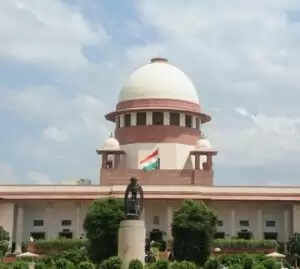Supreme Court to Review Controversial Waqf Amendment Act, 2025: What’s at Stake?
Supreme Court's Consideration of Waqf Amendment Act

In a significant development, the Supreme Court of India has agreed to consider urgent hearings regarding petitions that challenge the constitutional legitimacy of the Waqf (Amendment) Act, 2025. This decision was made during a session on Monday, where Chief Justice Sanjiv Khanna, alongside Justices Sanjay Kumar and KV Viswanathan, acknowledged the requests from senior advocate Kapil Sibal, representing Jamiat Ulama-i-Hind, for an expedited review of multiple petitions on this matter.
Sibal, along with fellow advocates Abhishek Singhvi and Nizam Pasha, highlighted the necessity for these petitions to be addressed promptly. The Chief Justice, who has eliminated the practice of oral requests for urgent listings, instructed the lawyers to submit written requests via letters or emails to facilitate the listing process.
When Sibal indicated that such submissions had already been made, the Chief Justice assured, “I will review the mentioning letter this afternoon and make a decision. We will schedule it.” Pasha also brought attention to a petition filed by Lok Sabha MP Asaduddin Owaisi.
Recently, President Droupadi Murmu approved the Waqf (Amendment) Bill, 2025, which had previously been debated extensively in Parliament. Several petitions, including those from Congress MP Mohammad Jawed, AIMIM leader Asaduddin Owaisi, and AAP MLA Amanatullah Khan, have been filed in the Supreme Court contesting the Act's validity.
The Jamiat Ulama-i-Hind's petition argues that the law represents a “direct assault on the Constitution,” which guarantees equal rights and religious freedom to all citizens. They claim that the Act is a “dangerous conspiracy” aimed at undermining the religious freedoms of Muslims.
The organization stated, “This bill poses a significant threat to the religious freedoms of Muslims. Consequently, we have challenged the Waqf (Amendment) Act, 2025, in the Supreme Court, and our state units will also contest its constitutional validity in their respective high courts.”
Maulana Arshad Madani, the President of Jamiat Ulama-i-Hind, has not only contested various provisions of the Waqf (Amendment) Act but has also submitted an interim petition to halt the law's implementation.
In a separate plea, the Samastha Kerala Jamiathul Ulema, a Sunni Muslim scholars' organization in Kerala, contends that the Act intrudes upon the rights of religious denominations to manage their own affairs. Their petition, represented by advocate Zulfiker Ali P S, argues that the amendments would distort the religious character of Waqfs and harm the democratic process governing Waqf and Waqf Boards.
The plea asserts that the 2025 Act violates the federal principles of the Constitution by centralizing power within the Central government, stripping state governments and State Waqf Boards of their authority over Waqfs.
It warns that the cumulative impact of these provisions could severely harm Waqfs and deprive the Muslim community of significant Waqf properties due to the enforcement of these regulations.
Additionally, an NGO, the Association for the Protection of Civil Rights, has filed a petition challenging the Act's constitutional validity. Jawed's plea claims that the Act imposes arbitrary restrictions on Waqf properties and their management, undermining the religious autonomy of the Muslim community.
Owaisi's separate petition argues that the Bill diminishes protections for Waqfs compared to those afforded to Hindu, Jain, and Sikh religious and charitable endowments, constituting discrimination against Muslims and violating Articles 14 and 15 of the Constitution.
The plea contends that the amendments irreversibly weaken the statutory protections for Waqfs and their regulatory framework, granting undue advantages to other stakeholders and interest groups, thus reversing years of progress in Waqf management.
Amanatullah Khan has also sought a declaration that the Waqf (Amendment) Bill is unconstitutional and violates multiple articles of the Constitution.
